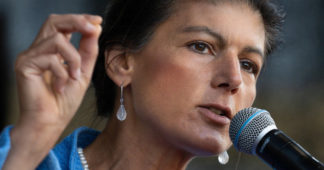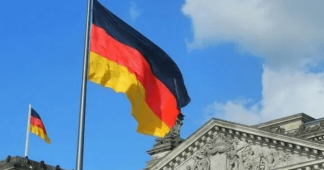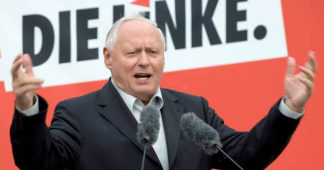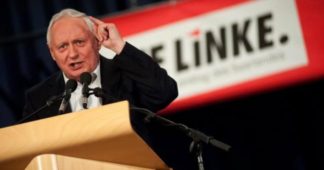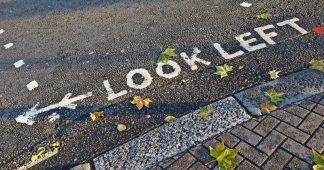Christine Buchholz
The German radical left party Die Linke (“The Left”) was founded in 2007, bringing together the Party for Democratic Socialism (the successor organisation to the former governing party in East Germany) and The Electoral Alternative—Work and Social Justice (Wahlalternative Arbeit und Soziale Gerechtigkeit), a West German electoral formation containing left-leaning social democrats as well as anti-capitalist activists. It quickly gained respectable levels of support, polling over 10 percent and winning seats locally, regionally and nationally. Yet, since the 2017 federal elections, the party’s performance has stalled, and it is now experiencing a deep crisis.
Christine Buchholz is a former Die Linke member of the Bundestag, Germany’s parliament. She was part of Linksruck (“Left Turn”), a revolutionary organisation affiliated with the International Socialist Tendency, which helped found Die Linke, dissolving itself and creating the Marx21 network in 2007. She spoke to Joseph Choonara about the crisis within Die Linke and a recent split that has occurred in Marx21.
Joseph: Die Linke has been a major feature of the European radical left, with tens of thousands of members. It now seems to be facing deep problems. The most recent symptom was the departure of Sahra Wagenknecht, one of its best known parliamentarians, who will now create her own breakaway party. I believe this means that Die Linke will lose its parliamentary group.1
Christine: Yes, Wagenknecht and nine other members of parliament announced the foundation of a predecessor to a party that will stand in the European elections.2 This break hasn’t come out of the blue; there have been lots of arguments. The most striking, from 2017, was her attack on the anti-racist and pro-migrant policies of Die Linke, which was met with an overwhelming vote against her position at the party conference.
For a time, there was a sort of power-sharing deal between Wagenknecht and parts of the right wing of Die Linke in order to contain these tensions in the party structures and the parliamentary group. However, this broke down after the war in Ukraine began, when Wagenknecht and her followers took quite a critical position towards NATO. After some weeks, she took a clear position against Vladimir Putin as well. Even though I don’t share all her arguments concerning the war between Russia and Ukraine, she was one of the most prominent anti-war figures in Germany. She made important speeches in parliament and was one of the few who publicly put forward the anti-war position, for example, on talk shows.3 The leadership of Die Linke took a position against German arms shipments, but it was weak and defensive in how it presented these sorts of arguments.
In February 2023, on the anniversary of the start of the war in Ukraine, Wagenknecht and Alice Schwarzer, a well known German feminist, organised a big demonstration of tens of thousands against the war. The leadership of Die Linke decided to abstain from this demonstration. Part of its argument was that the organisers had failed to clearly exclude forces from the extreme right from the protest, which was a genuine problem. However, we took a different approach; we organised anti-war activists in Die Linke around this issue, intervened in the mobilisation and kicked out some Nazis who appeared on the demonstration.
Wagenknecht also wrote a book—“Die Selbstgerechten”…
Joseph: I think I’ve seen it translated as The Self-Righteous.4
Christine: Yes, indeed, The Self-Righteous. In this book she argues that the left focuses only on urban, woke, queer and anti-racist people, leaving “normal people” and the working class to suffer. This argument is, of course, fatal for the left, because it counterposes the social interests of the working class with the pursuit of these other political issues.
Joseph: I get the impression that her positioning is to some extent an accommodation to the rise of the far-right Alternative für Deutschland (AfD; Alternative for Germany). People talk about her new organisation as a sort of “AfD of the left”—in other words, left wing on economic policy, but also sharing some of the AfD’s anti-migrant and “anti-woke” rhetoric.
Christine: This is one of Wagenknecht core arguments. She says that she wants to weaken the AfD by appealing to working-class people, as well as some middle-class people, on this basis. However, I doubt that such an approach can weaken the AfD. In fact, it will strengthen the far right. Incidentally, Wagenknecht is painted as a very radical figure in Germany, but, for example, her economic outlook is an ordoliberal view, which is only really left wing in comparison to the mainstream debate.5
Some comrades in Die Linke argued that she stands for something like an “AfD-lite”. I think this evades the responsibility of the Die Linke leadership, which left a lot of space for her to develop in this direction. It’s important to understand that the current crisis of Die Linke has deeper roots. The party was founded on the back of a wave of struggles and social movements: workers’ struggles, the movement against neoliberal globalisation, the anti-war movement and so on. When these struggles declined, the orientation on parliamentarism got stronger and stronger, and Die Linke accommodated to the political system.
Joseph: Yes, I’d like to turn to this wider context, because the split in Die Linke comes in the context of the reversal of this long period in which it was a rising force in German politics. Until around 2017, the organisation was doing quite well electorally. Yet, by 2021, it had suffered a sharp decline. I think about a million people defected to other parties in the elections that year. That seems like a huge problem, particularly in a context in which Die Linke was more exclusively focused on electoral work.
Christine: First of all, you can’t underestimate the importance of the context within which Die Linke was able to rise. At that time, its self-understanding was based on organising people on the ground and in localities. In the trade unions there was always a division of labour between economic work and political work, but beyond that the party structure was connected to concrete mobilisations and campaigns.
However, Die Linke has existed for 16 years, and the longer it has existed, the more the logic of parliamentarism has come to the fore. I think that we underestimated the dynamics of these developments and how much this is reflected in debates within the party as well as its very understanding of itself.
I stood in four elections, and I found some notebooks I kept in 2009, during the first election campaign. We had five subcommittees in different parts of the cities within the area where I was standing as a candidate, which shows there was a very high degree of mobilisation. Later, it had reduced down to one tiny group of people organising within the area. There was a much lower degree of activity.
There was also a stronger focus on local elections, with these local bodies becoming the main focus of activities for much of the left.
Joseph: Moreover, at the national level the mainstream social democrats in the Social Democratic Party (SPD; Sozialdemokratische Partei Deutschlands) and the Greens tilted a bit to the left after the departure of former chancellor and Christian Democrat leader Angela Merkel.6 This seems to have squeezed Die Linke in 2021.
Christine: Yes, this is an accurate picture for the 2021 elections. However, it doesn’t explain the whole problem.
In 2021, a new party leadership was elected, with a former Marx21 comrade, Janine Wissler, and another woman, Susanne Hennig-Wellsow, from the reformist right of the party. Hennig-Wellsow was leading the parliamentary group in the parliament of the eastern state of Thuringia, where Die Linke is in government. She was quite strong against the AfD. For example, when the Thuringian branch of the liberal Free Democratic Party (FDP; Freie Demokratische Partei) accepted votes from the AfD to install local FDP leader Thomas Kemmerich as minister-president, the heads of the other parties were invited to present bouquets of flowers to him. The cooperation between the FDP and the AfD was a scandal—it violated the principle of maintaining a “firewall” between the political mainstream and the far right. Hennig-Wellsow refused to shake Kemmerich’s hand and threw her bunch of flowers on the floor at his feet.7
Thus, Hennig-Wellsow had an image as anti-right, but her spin on the election campaign involved Die Linke saying, “There is a progressive camp in society and there’s a right-wing camp. If it’s possible for the progressive camp to win, we shouldn’t stand in its way.” Thus, she argued against positioning ourselves too strongly against the SPD and the Greens. This led to a situation in which Die Linke was not very visible during the election campaign. People who wanted to vote for the left-wing camp simply went with the Greens or the SPD. After all, these are bigger parties with more chance of forming a government to “keep out the right”.
There was also another serious problem with the defensive arguments put by Die Linke. You may remember this was the same summer when the Taliban took over again in Afghanistan, following the US withdrawal from Kabul in August 2021, and there was an argument about this. There was a vote in parliament for the German army to send soldiers to bring people out of Afghanistan. The left wing of Die Linke argued that, naturally, we were in favour of getting people out of Afghanistan and opening the borders, but we were also against sending special forces and the Bundeswehr (the German armed forces). Meanwhile, the leadership and the right wing of the party argued we couldn’t vote against sending troops. The debate within Die Linke led to an attack by the right-wing press, which claimed that we didn’t want to save Afghan lives—utterly ridiculous, of course, because we were the ones who were fighting to open the borders for refugees and so on. The defensiveness of our leadership disarmed us in the face of these attacks.
Still, I think the general problem in Die Linke has been that it is focused on elections and parliament, so the majority of decision makers within the party don’t want to confront public opinion. They don’t want Die Linke to appear as an anti-establishment party that is willing to go against the mainstream. So, the issues go much deeper than just having the wrong political line in any single election campaign.
Joseph: I want to speak about the implications of all this for revolutionary socialists. You were a part of Linksruck, a German revolutionary socialist organisation that was involved in a broader anti-capitalist current that was part of Die Linke when it formed. What do you make of the approach of having revolutionaries seeking to organise within the context of a larger left-wing reformist electoral party?
Christine: Well, the whole process started in 2003-4 with a number of big demonstrations against the Red-Green government.8 In 2005, the predecessor to Die Linke, The Electoral Alternative was founded.9 Die Linke was formed two years later. Revolutionaries and parts of the radical left played a crucial role in this whole process, and we could influence the character of the party to some extent. For example, I and others were very active in the anti-war movement and the campaign against NATO intervention in Afghanistan.
We could ensure a strong identification with these mobilisations and the protests against the Bolkestein directive.10 We had a huge demonstration against a G8 summit being held in the eastern city of Rostock. These mobilisations shaped the self-understanding of the whole organisation. It also allowed useful debates. For example, we managed to establish a solid position against Islamophobia in Die Linke, which involved a long debate. There was space for us to act and to win people. In addition, we could mobilise people in wider fights. For instance, we could, together with others, initiate Aufstehen Gegen Rassismus (“Stand Up Against Racism”), a campaigning alliance against the AfD.
Joseph: I’m interested in this aspect of the story. Here in Britain, we have a revolutionary organisation, the Socialist Workers Party. If we want to fight the racist right, we can form a united front, such as the Anti-Nazi League, Unite Against Fascism or, more recently, Stand Up to Racism, within which we work with reformist organisations and figures but are also able to independently present our arguments and tactics. We might work with different groups of people in other struggles, such as within the unions and to oppose a war. Operating through Die Linke seemed more complicated to me. Although you can shift more people if you win Die Linke, on some questions there won’t be clarity on these struggles, so forming a united front is more complex.
Christine: For several years, we did just operate through Die Linke, which most of the time seemed helpful. For example, we could mobilise against the G8 summit as Die Linke, and we could also organise the anti-war movement in that way. I’m still representing Die Linke in Aufstehen Gegen Rassismus, though this doesn’t mean that Die Linke as a whole is very active there. However, considering Marx21 was an organisation of a couple of hundred people in a country of 82 million, it gave us possibilities to talk to larger numbers of people.
At the same time, we underestimated the pressures of reformism. You have to represent the positions and the programme of Die Linke. The basic programme, decided in 2012 in the city of Erfurt, was relatively flexible. Nonetheless, of course, the pressure is enormous. That might be no problem working in the movement against the war in Afghanistan and in an anti-fascist alliance, but it becomes a problem over issues such as Palestine. On this issue there is a division in German society as well as in the broader left. It was similar when Russia invaded Ukraine.
We did not reflect enough on this. I was also subject to direct pressure when I was in parliament and sat on the defence committee, where I was obviously standing against everything the government was doing. It was possible for me to resist this pressure with the support of my organisation and the comrades working with me, but the pressure was very strong. Marx21 comrades were drawn into Die Linke’s structures—not only as elected representatives like me, but also in the apparatuses of the party, and this is quite a different story. If you’re an elected representative and don’t agree, you can say, “I’m standing on a different basis.” However, it can feel different if you’re working for the organisation, which means your job depends on it.
We underestimated these kinds of pressures. In 2007, we dissolved Linksruck and reorganised as the Marx21 network. We had regular annual conferences, but comrades were active mainly in, and operating through, Die Linke. We maintained a magazine and a website, and we published booklets. However, without tight organisation, these publications could not structure the activity of the comrades in Die Linke. For example, we had an article about a successful blockade of the AfD’s conference by anti-fascist activists led by Die Linke, with our comrades at the core of the action, but there was no organised debate elsewhere about this. The magazine was read individually and sold by a tiny minority. We should have maintained a much tighter organisation so we could discuss our experiences and enhance our decision making.
Instead, different political strategies and tactics developed, leading to the crisis in Marx21 in 2023, which led the organisation to fracture.
Joseph: Can you tell me a bit more about how this crisis emerged in Marx21?
Christine: There has been an argument for more than a decade about how to operate in Die Linke. This involved the practical aspects as well as how to maintain a coherent revolutionary set of ideas. This debate was never really resolved.
Marx21 grew over the years. This never involved huge numbers, but it did grow slowly, attaining a higher degree of activity in many places. Yet, we saw new Marx21 groups emerging and then disappearing again. We couldn’t build the organisation in a sustained way. This was reinforced by members being drawn into Die Linke’s apparatus. I think we might have been able to manage this if we had proper internal democratic debate and decision-making structures, but we didn’t. Moreover, there was no open argument about different perspectives. Instead, we tried to compromise on political arguments or to solve them in practice. Then we would move onto the next activity or initiative without solving the underlying problems.
Rather than open debate, a parallel structure was created by Marx21 comrades who disagreed with the perspective that had initially been the majority position of the organisation. They built up a secret faction over many years, connecting their activity to a firm that they set up to sell their organising services to trade unions. The firm was not the core of the problem, but it was one expression of it.
In January 2023, this formerly secret grouping, later calling itself the “Ringo” faction, tried to take over the organisation. Over nine months, we had a process of discussion about the future of Marx21 and our perspectives in Die Linke, but there was still a no real and open political debate. In the end, this led to a split in the organisation, with myself and many other comrades leaving Marx21 in October.
Joseph: You left after the most recent Marx21 conference, I think.
Christine: Yes. We had a special conference and tried to put our perspectives for Marx21, but we couldn’t win a majority. The other section of Marx21 mobilised a lot of people—although, to be honest, I’m not sure on what political basis they did this. Furthermore, 27 comrades from another opposition current within Marx21, known as FIST (Für eine internationale sozialistische Tendenz; “For an International Socialist Tendency”) were excluded five weeks before the conference, which shifted the balance of forces in the favour of the Ringo faction.
Joseph: I remember discussions with comrades in Marx21 over the years. There were different formulations at different points, but the basic understanding at the beginning of the process was that Marx21 would eventually have to break with Die Linke and found a larger revolutionary party. The model here seemed to be the Independent Social Democratic Party in Weimar Germany.11 I always struggled with this analogy because Germany was experiencing a revolution in the 1918-23 period, but it’s been very far from that in recent years. Moreover, it was unclear to me whether those people being won to Marx21 had a shared understanding of the need to break with Die Linke and a shared vision of how that can happen.
Christine: To be honest, there was no real common vision and strategy. No one really thought Die Linke would turn into a revolutionary party. There is the abstract notion that we wanted to have a mass revolutionary party at a certain point, but there was no shared idea as to how this could happen. Thus, different individuals had their own ideas about it.
There were some broader confusions related to this. For instance, we argued for the united front approach in our work within social movements, even though Die Linke was not a revolutionary party but rather a left-wing reformist party. At the same time, Marx21 barely had an independent intervention in the movements as an organisation. We also tried to create a variety of united fronts internal to the party—for instance, in our anti-war, anti-racist and anti-fascist work.
Additionally, there were several wider groupings within Die Linke itself. When we joined there was a question: should we unite with other revolutionaries in the anti-capitalist current within Die Linke? Instead, we joined the Socialist Left current, which was more oriented on the trade unions. We thought that it was important to have a class-orientated approach within the party.
In 2017, the Socialist Left current turned towards the camp of Wagenknecht, causing some of the Marx21 leadership to push for the founding of a so-called Bewegungslinke (“movement left”), with the idea of shaping a new left wing in Die Linke. This, however, did not happen. Instead, the “movement left” shifted towards the centre-ground of the party.
What we learned is that there is an urgent need for revolutionaries to have a greater degree of political independence and to avoid getting drawn into this swamp.
Joseph: Tell me a little bit more about the new organisation, of which you’re a member, that has emerged from the crisis in Marx21.
Christine: We have just had a founding meeting of the Initiative for Socialism from Below.12 It’s not the finished organisation we want, but we have started to organise a political and strategic debate. This includes an analysis of the crisis of Die Linke and the question of how we should relate to Die Linke in particular and reformism in general. This also necessitates an analysis of the overall political situation and the crisis of the Red-Green-Yellow government and the multiple broader crises we are facing.13
We’ll found the new organisation in January. We have ended our existence as a loose network within Die Linke and started to build an independent organisation. We are partially operating in Die Linke, but we are also able to act independently. For example, within the Palestine solidarity movement that has emerged since the Israeli attack on Gaza in October, we have held meetings and issued leaflets on demonstrations. We do not make ourselves dependent on the broader reformist party.
We have also started to produce publications. We had a magazine in Marx21, but producing and selling this was not part of the core activity of the group. It was there, but you could be a Marx21 member and never really participate in selling it, reading it and discussing the contents.
We have also intervened with leaflets on anti-war protests and at the party conference of Die Linke. A pamphlet on Palestine just went to press.
We are still discussing how to organise. There were nearly 400 members in Marx21; now, we are smaller. We are not represented in as many cities. We have a strong group in Berlin, but there are many places where we number in the ones and twos. Many of our comrades are working politically in their workplaces, but we don’t have coherent industrial work at the moment. Achieving this probably won’t be the first step, but it could be an important second step. At the moment, we are concentrating on Palestine solidarity and the fight against the AfD. Nevertheless, of course, we know that we need a broader perspective.
We also decided that we want to be a formal member of the International Socialist Tendency (IST).14 Back in 2007, when Marx21 was set up, we decided to change our status; Marx21 was an observer rather than a member of the IST, because we were a bit defensive about operating openly as a part of the IST in Die Linke. Not having a clear and open position on this increased the confusion about the role and nature of the organisation.
Christine Buchholz is a former Die Linke member of the Bundestag, Germany’s parliament, and part of Initiative Sozialismus Von Unten (“Initiative for Socialism from Below”).
Notes
1 The maintenance of a faction in the Bundestag requires 37 members of parliament. With the departure of Wagenknecht and her allies, Die Linke will be left with just 28 parliamentarians. Having a faction secures important funding for parliamentary work and to run party apparatuses, such as the Rosa-Luxemburg-Stiftung (Rosa Luxemburg Institute), Die Linke’s policy development and educational foundation.
2 Elections to the European Parliament are scheduled for June 2024.
3 Compared to countries such as Britain, Germany has experienced a much higher level of popular mobilisation against NATO involvement in the war in Ukraine. Shipments of tanks, armoured personnel carriers and other weapons to Ukraine have been a focus of national political debate, especially because these contravene a long taboo on Germany sending arms to conflict zones.
4 The full title of Wagenknecht’s 2021 book is Die Selbstgerechten: Mein Gegenprogramm—für Gemeinsinn und Zusammenhalt (“The Self-righteous: My Counter-Programme—For Public Spirit and Solidarity). The book is not available in English translation.
5 Ordoliberalism (“Ordoliberalismus” in German) was the term used in post-war West Germany to describe a social market economy with a strong state that creates the basis for market competition.
6 Angela Merkel was chancellor (a position roughly equivalent to that of the prime minister in Britain) from 2005 until 2021. Her Christian Democratic Union is the traditional party of capital in Germany.
7 Kemmerich’s cooperation with the AfD attracted fierce criticism throughout the country, with protests taking place. He resigned three days later and was replaced by his Die Linke predecessor, Bodo Ramelow.
8 A coalition of the SPD and Greens came to power in 2002, headed by Gerhard Schröder. Schröder launched the Agenda 2010 neoliberal reforms as well as the Hartz IV plan, which sought to liberalise the German labour market.
9 The most prominent member of this organisation was Oskar Lafontaine, a left-leaning former finance minister who left the SPD.
10 The Bolkestein directive established a free market in services across the European Union, provoking protests across many member states.
11 The Independent Social Democratic Party (USPD; Unabhängige Sozialdemokratische Partei Deutschlands) was a left-wing split from the SPD that emerged in 1917. The turmoil generated by the First World War, the Russian Revolution and the growing class struggle in Germany turned the USPD into a mass party. The majority of the USPD fused with the Communist Party of Germany in 1920. For more on this, see the discussion in Joseph Choonara’s “Revolutionaries and elections” in International Socialism 179.
13 The current German government is made up of the SPD, the Greens and the neoliberal FDP.
14 The IST is an international grouping of revolutionary socialist organisations, which includes the Socialist Workers Party in Britain. News and updates from the IST are available at https://internationalsocialists.org
We remind our readers that publication of articles on our site does not mean that we agree with what is written. Our policy is to publish anything which we consider of interest, so as to assist our readers in forming their opinions. Sometimes we even publish articles with which we totally disagree, since we believe it is important for our readers to be informed on as wide a spectrum of views as possible.
